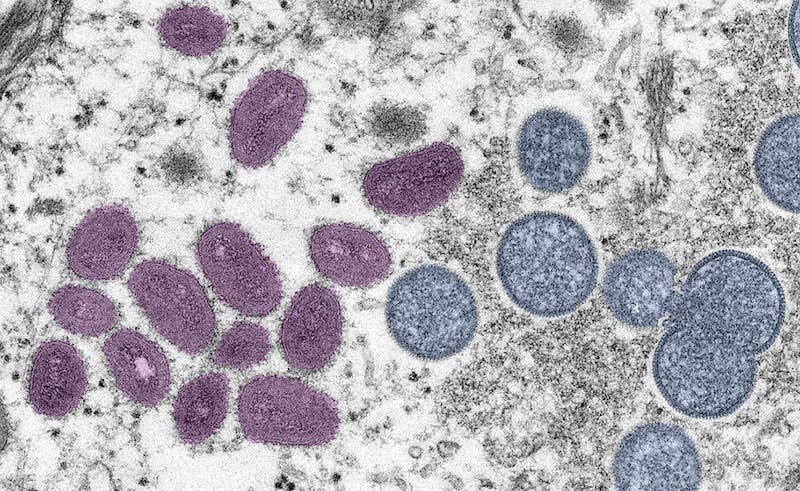Questions about monkeypox answered by Ingham County Health Department – The State News

The Ingham County Health Department responded to growing concerns of the monkeypox virus (MPV) outbreak on Thursday by hosting a live-streamed question and answer session via Facebook and Instagram. Community members voiced their opinions about the stigmatization of the virus, as well as how it will affect the county.
Jason Blanks, Executive Director of the Capital Area Health Alliance, began the session by inviting Cristin Larder, senior epidemiologist for ICHD, to discuss the data trends she has observed.
“The areas with higher populations are seeing more cases,” Larder said.
She stressed that the threat to the public is low, with only five probable cases in the county so far.
Different tests from COVID-19
The phrase “probable cases” sparked interest in the comment section of the live stream, leading Larder to specify. She said that monkeypox does not function the same way that COVID-19 does.
“The tests that we use are different,” Larder said. “There’s a global orthopox test that’s done first.”
This test does not exclusively test for monkeypox, but the family that includes diseases like smallpox. However, if the test comes back positive, it is probably a monkeypox case because smallpox is not currently having an outbreak. The next step is to send the test to the Center for Disease Control for further testing.
Where it is spreading
Dr. Shoyinka, Medical Director for Ingham County, went on to discuss how the virus spreads among social networks. She emphasized that monkeypox is not a sexual-orientation-specific disease, but that this virus had spread through communities in predominantly gay communities.
The primary “mode of transmission is through direct skin-to-skin contact,” or “direct close, prolonged contact with someone who has monkeypox.” Shoyinka said.
While communities in which men have sex with men are the most affected by the virus currently, Shoyinka specified that it is not a sexually transmitted virus and anyone can become infected – regardless of their sexual orientation.
She continued that clinics are aware of the stigma being spread and said that professionals are being “very deliberate about reducing that stigma” and “keeping health equity in mind.”
Symptoms, masks and vaccines
As for symptoms, Shoyinka said that the “heralding sign that people notice” are the lesions that show up in rashes as well as fever and pain.
In a COVID-19 influenced world, community members asked about the effectiveness of mask wearing. Infection preventionist Lauretta Ellsworth said that while the virus is generally not airborne spread like COVID-19, it may still be appropriate to wear a mask and other personal protective equipment in some situations.
“With monkeypox, it’s more of that skin-to-skin contact as opposed to droplets or airborne,” Ellsworth said. “If you are anticipating any interaction with bodily fluids or skin-to-skin, to use those as cues to either wear a gown, gloves, mask.”
Ellsworth said appropriate situations include those where one may be living with an infected individual, caring for an infected individual or working in a clinical setting.
As for vaccinations, Larder said Ingham County clinics have vaccinated 141 patients for monkeypox so far.
Shoyinka said that vaccines are limited, which has led to the Center for Disease Control altering the delivery method of them. Monkeypox vaccines will be administered intradermally – meaning the dose is injected between the layers of one’s skin, instead of the usual method of injecting into muscle tissue.
Support student media! Please consider donating to The State News and help fund the future of journalism.
“The reason for that is so that we can have more vaccines,” Shoyinka said. “If we do it intradermally … a lower dose will still have the same effect.”
Risk for transmission
Co-habituating with other people increases the risk of transmission, Shoyinka said, as living with roommates or having multiple people in your family increases the chance for skin-to-skin contact.
Furthermore, she reminded the audience that monkeypox is a zoonotic disease, meaning it originated in animals and spread to humans. Because of this, she advised those infected to isolate from pets, as it could spread to them.
College students are at higher risk for transmission, Shoyinka said. She named common student housing situations, like living in dormitories or with multiple roommates, being a primary reason for the risk factor.
“There’s a lot of close contact. People are roommates, parties, things like that,” Shoyinka said. “All of those things are things that can precipitate an outbreak.”
The ICHD has been working with MSU leadership, and is stressing delivering an “adequate information to students,” Shoyinka said.
If an individual finds themselves with a rash they believe is monkeypox, the ICHD urges to them to contact their primary care provider to get tested. More important information on monkeypox, including data and prevention, can be found at Michigan.gov/monkeypox.
Discussion
Share and discuss “Questions about monkeypox answered by Ingham County Health Department ” on social media.
